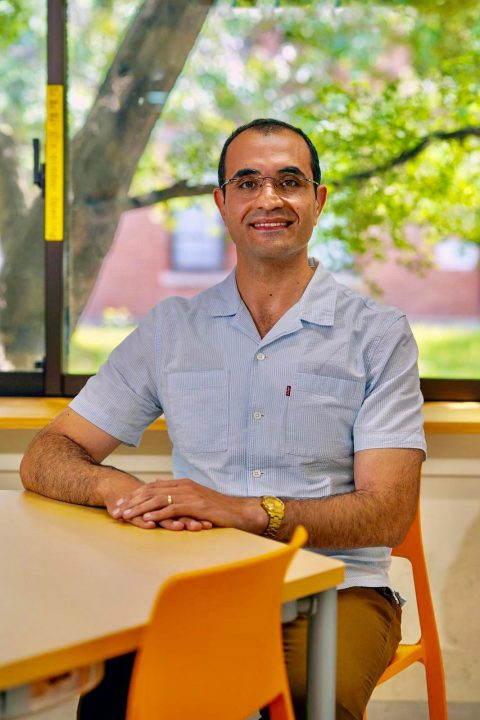スタッフ紹介
Daneshgar, Majid

- 部門・職位
- 社会共生研究部門
准教授 - 専門
- Orientalism, Philology, Religions, Inscriptions, Manuscripts, Muslim Traditions, Shi'ism, Persianate-Malay
- 研究分野/キーワード
- Southeast Asian Studies; Persianate and Indian Ocean Worlds; transregional intellectual traditions, Shi‘ism, Orientalism, method and theory in the study of religion
- 連絡先
- daneshgar@cseas.kyoto-u.ac.jp
Daneshgar, Majid
研究概要
My work connects Southeast Asian Studies to broader circulations or the Persianate and Indian Ocean worlds through studies of trans-regional intellectual and exegetical traditions, Shi‘ism, Persian- Shi‘ism, Orientalism and method and critical theory in the academic study of religion.
Prior to my move to Kyoto, I was a Cambridge University Library Fellow in association with St John’s College, University of Cambridge, where I worked on one of the oldest collections of oriental manuscripts in Europe. My new critical catalogue of that collection, including Arabic, Persian, Ottoman Turkish, Turkic (from Central Asia), Malay, Indonesian, Telugu, Syriac, Hebrew, Coptic materials is now in preparation for publication. Prior to this I had over the course of my early career examined around two hundred previously unstudied manuscript sources in New Zealand, to compile a multi-lingual census of Islamic manuscripts.
My monograph, Studying the Quran in the Muslim Academy (AAR-Oxford University Press, 2020) was nominated for the Best Publication Prize, and was subject of an academic symposium with Brill and of graduate theses in Indonesia. My first monograph, Tantawi Jawhari and the Qur’an (Routledge 2018) has been translated into Arabic by The Human Foundation in Egypt, and my article “How Intellectuals Censor the Intellect: (Mis-Representation of Traditional History and its Consequences” was awarded “the Best Publication Prize 2022”. I was also nominated for the Most Inclusive Teacher Award at the University of Otago in 2015. I also (co-)edited several volumes with Routledge, Brill, Zygon and ILEX-Harvard University Press. My other publications include a series of articles and chapters on reception of nature and the natural knowledge in Muslim intellectual discourses from the Middle East to Southeast Asia (e.g., 2015, 2017, 2019, 2020, 2021), censorship in Muslim literature, and rare illuminated manuscripts.
One of the main aspects of my current work is on studies of the Persianate-Malay World over the course of history that examine inscriptions, manuscripts, Islamic sciences, modern literature, politics, poetry, Sufism, supplications and occultism. Here at CSEAS I will be furthering work in such direction on multiple projects, including collaborations with my colleagues at Kyoto and other parts of the world. Also, several new projects will be produced with Professor Michael Feener using source material discovered and archived by the Maritime Asia Heritage Survey.
Prior to my move to Kyoto, I was a Cambridge University Library Fellow in association with St John’s College, University of Cambridge, where I worked on one of the oldest collections of oriental manuscripts in Europe. My new critical catalogue of that collection, including Arabic, Persian, Ottoman Turkish, Turkic (from Central Asia), Malay, Indonesian, Telugu, Syriac, Hebrew, Coptic materials is now in preparation for publication. Prior to this I had over the course of my early career examined around two hundred previously unstudied manuscript sources in New Zealand, to compile a multi-lingual census of Islamic manuscripts.
My monograph, Studying the Quran in the Muslim Academy (AAR-Oxford University Press, 2020) was nominated for the Best Publication Prize, and was subject of an academic symposium with Brill and of graduate theses in Indonesia. My first monograph, Tantawi Jawhari and the Qur’an (Routledge 2018) has been translated into Arabic by The Human Foundation in Egypt, and my article “How Intellectuals Censor the Intellect: (Mis-Representation of Traditional History and its Consequences” was awarded “the Best Publication Prize 2022”. I was also nominated for the Most Inclusive Teacher Award at the University of Otago in 2015. I also (co-)edited several volumes with Routledge, Brill, Zygon and ILEX-Harvard University Press. My other publications include a series of articles and chapters on reception of nature and the natural knowledge in Muslim intellectual discourses from the Middle East to Southeast Asia (e.g., 2015, 2017, 2019, 2020, 2021), censorship in Muslim literature, and rare illuminated manuscripts.
One of the main aspects of my current work is on studies of the Persianate-Malay World over the course of history that examine inscriptions, manuscripts, Islamic sciences, modern literature, politics, poetry, Sufism, supplications and occultism. Here at CSEAS I will be furthering work in such direction on multiple projects, including collaborations with my colleagues at Kyoto and other parts of the world. Also, several new projects will be produced with Professor Michael Feener using source material discovered and archived by the Maritime Asia Heritage Survey.